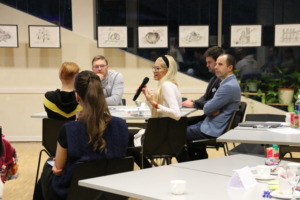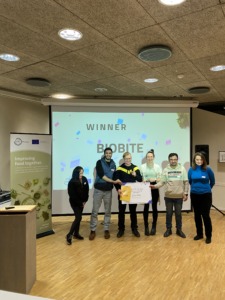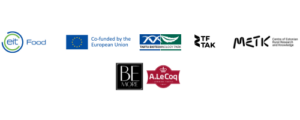Fruit Sticks Idea Wins Food Hackathon
In late November, the Hack the Future of Food hackathon brought together innovative minds to tackle major challenges in the food sector, focusing on reducing food waste and creating more sustainable food production methods.
Challenges in the Food Sector
The current food system significantly contributes to global issues like climate change, resource depletion, and poor health outcomes. For example:
- One-third of all produced food goes to waste.
- The food industry consumes 70% of the world’s freshwater resources.
- Food production accounts for 26% of greenhouse gas emissions.
Building a sustainable future for food requires a systemic approach, including zero-waste production, sustainable farming practices, reducing food waste, and adopting circular economy principles to reuse resources efficiently and recycle byproducts.
26 Hours of Innovation
The hackathon gathered six teams, each working tirelessly over 26 hours to tackle two challenges set by METK, three by TFTAK, and one proposed by the participants themselves. Teams had the opportunity to pitch their ideas, hear inspiring presentations, and form valuable connections. Many participants planned to continue developing their projects post-hackathon.
A Collaborative Journey Toward Innovation
Participants were guided through structured activities, starting with a Design Thinking Training by Taavi Tamm that equipped teams with creative problem-solving tools to approach their chosen challenges. The following day, inspirational keynotes by Mariliis Mia Topp (Raw Edge) and Rain Kuldjärv (TFTAK) sparked motivation, while a Pitching Workshop with Vaido Mikheim (Startup Estonia) helped participants refine their ideas and presentation skills.
 Participants fine-tuned their ideas with several mentor rounds with Alo Lilles, Kirti Kooser, Mariliis Mia Topp, Mati Freiberg, Oliver Loit, Rain Kuldjärv, Viljam Viljasoo. Most of them were also jury members. The event concluded with exciting final presentations, where teams pitched their innovative ideas to a panel of experts.
Participants fine-tuned their ideas with several mentor rounds with Alo Lilles, Kirti Kooser, Mariliis Mia Topp, Mati Freiberg, Oliver Loit, Rain Kuldjärv, Viljam Viljasoo. Most of them were also jury members. The event concluded with exciting final presentations, where teams pitched their innovative ideas to a panel of experts.
Winning Solution: BioBite’s Fruit Sticks
 The BioBite team emerged as the winner with their concept of 100% edible and delicious fruit sticks, developed using food industry byproducts. Remarkably, the team secured an investor during the hackathon to help prototype their idea.
The BioBite team emerged as the winner with their concept of 100% edible and delicious fruit sticks, developed using food industry byproducts. Remarkably, the team secured an investor during the hackathon to help prototype their idea.
Laura Kuklase, a member of the BioBite team, explained: “Our idea for fruit sticks is still in development. Our team is refining the ingredients to create a stable, high-quality product. The production process will safely utilize food industry leftovers, helping reduce waste and give new life to valuable raw materials.”
Special Awards
- Tartu Biotechnology Park Mentorship Award: BumpFuel
The BumpFuel team proposed a science-based online platform offering personalized nutritional recommendations for pregnant women. They aim to enhance maternal and child health with research-backed guidance and are already exploring partnerships with existing pregnancy app developers.
TFTAK Special Award: VFM
The VFM team’s concept of a vertical farm solution for protein production addresses the need for sustainable and resource-efficient food production. With TFTAK’s support, they plan to advance protein extraction technology and refine their concept.
Other Noteworthy Ideas
- Improving consumer understanding of “Best Before” and “Use By” dates to minimize food waste.
- A web platform that uses QR codes to display the nutritional composition of meals in restaurants and cafés.
- An AI-powered personalized nutrition app promoting local and sustainable food choices.
Looking Forward
Most teams intend to further develop their ideas. Their next milestone is sTARTUp Day 2025, where they will pitch their solutions to potential collaborators and investors.
Hack the Future of Food showcased the immense potential of collaboration and creativity in solving critical food sector challenges. The winning solutions and ideas promise to make significant strides in building a sustainable and responsible food system.



